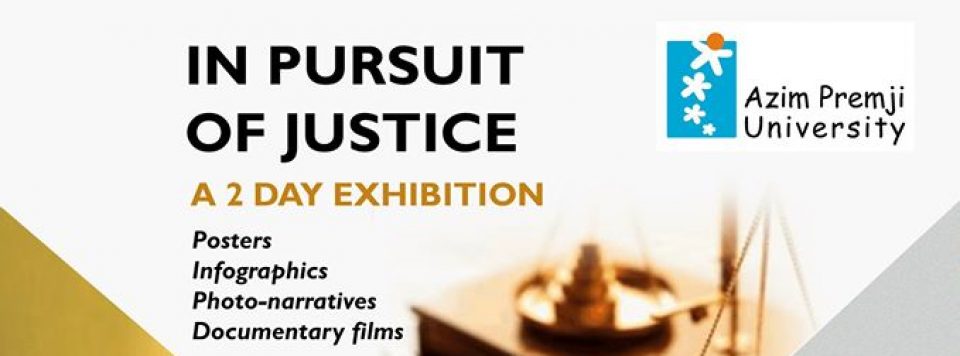Home » Articles posted by sreeharica
Author Archives: sreeharica
Clinic Exhibition Invitation
In Pursuit of Justice || A Journey through Three Developmental Clinics
Date: April 23, 2016 (Saturday) and April 24, 2016 (Sunday); Time: 11.00am – 6.30pm
Venue: Vismaya Gallery, Rangoli Metro Art Center Boulevard, Mahatma Gandhi Road, Bengaluru – 560 001
The Law and Governance Clinics at Azim Premji University, Bangalore are hosting a 2-day Clinic Exhibition entitled ‘In Pursuit of Justice’
We cordially invite you to attend our exhibition on Saturday, 23rd April, 2016 and Sunday, 24th April 2016 at the Vismaya Gallery, Rangoli – Metro Art Center Boulevard, Mahatma Gandhi Road, Bangalore – feel free to drop in anytime from 11.30 am to 6.30 pm. Do join clinic educators and student members of the clinics to learn more about experiential education and the work that students are undertaking on urgent issues concerning justice and development. Come and experience the journeys of the three clinics through shared learning and reflection.
The exhibition features work carried out between August 2015 and April 2016 by the Local Governance Clinic, the Land Governance Clinic, and the Human Rights Clinic at Azim Premji University.
We also have a panel discussion ‘Learning through Developmental Clinics’ with clinic educators from Azim Premji University at 4 pm on Saturday, 23rd April 2016.
Details about the Law and Governance Clinics at Azim Premji University can be found online here.
For any enquiries, contact bhavna.jha@apu.edu.in or abhayraj.naik@apu.edu.in
Find our event on Facebook at: http://bit.ly/1U4CyyX
We look forward to seeing you there.
Sign yourself up for the Event on Facebook!
SDMC’s in Nangali Gram Panchayat- An Overview
Many initiatives were taken by the central government of India and the state governments respectively to improve the accessibility and quality of school education in India. The Government of Karnataka has taken a ground-breaking step to make school education more participatory with the involvement of parents in the school’s decisions. The government established School Development and Monitoring Committees (SDMC) to ensure community participation in the education of their children. The SDMCs under the Karnataka Panchayati Raj Act of 1993 have been operational since 2006.[1] The law mandates that each school should constitute SDMC.
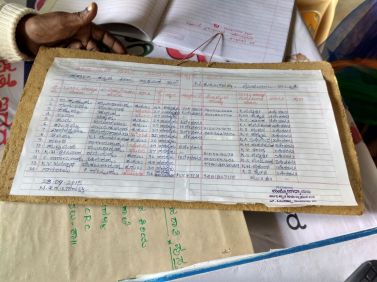
Image: Members of SDMC in a school
The field site, Nangali Gram Panchayat constitutes of eight villages. The schools in all the eight villages have SDMC setup. We interviewed the teachers, headmasters and in some schools the parent members of the committee regarding the functioning and need of such a committee. The teachers responded that they have formulated SDMC keeping in mind the guidelines specified in the Act. Most of the school headmasters were generous enough to show us the minutes of the meetings that they have conducted over the last few months. The law mandates that the meetings of SDMC should be held atleast once in a month. But in most of the schools (75%) that we visited, the meetings were held once in three or four months. The data (on papers) shows that the committees are formed, however in practice/on ground, we discovered that the committees are formed but the meeting were not conducted atleast once after the commencement or orientation meeting. When asked about the problems they are facing in functioning of the committee, the teachers said that the parents do not turn up for the meetings and hence if there is no quorum, the meeting gets either postponed or cancelled.
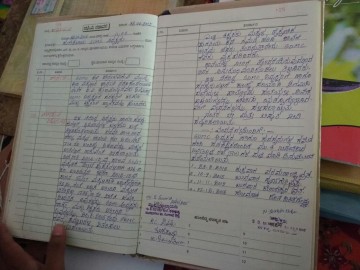
Image: Minutes of the meeting book
We found that approximately in 60% of the schools, the members of the committee were not aware of their duties and responsibilities. The teachers and the headmasters were hesitant to introduce the parents to us. What surprised was the fact that in some schools, some members were not aware that they are the members of a committee. Most of the parents are part of these committees just for the sake. The parents of most of the students work as daily laborers and it is very difficult for them to leave work and come for the meetings. They say if they do not work and attend the meeting then their children will have to starve for a meal. Their only source of income is their daily wage and they cannot compromise on it. The schools where parents are not participating are facing extreme danger of polluted water, shortage of books and uniforms, leaking roofs etc.
.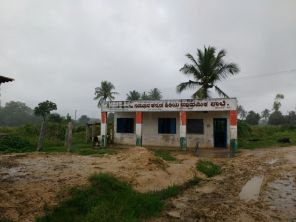
In contrast, The two schools we visited has committee that is constituted and functioning regularly. The result of such participation is seen from outside the school itself. The schools have pukka (concrete) buildings, toilet facilities, water tap connection etc. The parents are participate efficiently, meet regularly and decide on the issues that the school is facing and take it to the higher authorities. The parents also monitor the attendance of the teachers which results in the improvement of learning outcomes of the students.
We believe that there is need for community participation and monitoring mechanisms for the better functioning of the schools and SDMC is a great platform to fulfill this. Having said this, our experience with the eight schools in Nangali Gram Panchayat is that there is lack of capacity building training amongst the members of the committee. If there is proper training, awareness workshops, and some incentive for parents to participate in the school planning then SDMCs can achieve the goal with which they have been instituted.
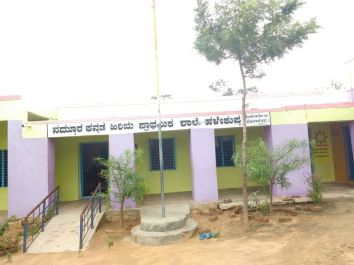
[1] The Law is, ‘ The Karnataka Gram Panchayat’s (School Development and Monitoring Committees) (Model) Bye-Laws, 2006’
Water and Sanitation Committee Meeting- Bethamangala
We attended the Water and Sanitation Committee meeting at Bethamangala Gram Panchayat, Bangarpet Taluk, Kolar on 19th Dec 2015. The committee is formulated under Sec 61a if the Karnataka Panchayati Raj Act. Under Sec 61a ‘a Gram Panchayat may appoint one or more Committees consisting of such members as it may decide for any purpose other than those specified in Sec 61 and may invest the Committee so appointed with such powers and functions as may be necessary or expedient for the fulfilment of the purpose for which it is appointed’. Bethamangala Gram Panchayat has constituted 6 such committees (Water and Sanitation Committee, Housing committee, Education and Health Committee, Public Food Distribution System Committee, Bio-Diversity Committee, Tax Collection Committee). The Members of these Committees are Gram Panchayat Members and each Committee is headed by the Gram Panchayat President. Each Committee has 7 members including the President and the PDO. The Panchayat Development Officer (PDO) acts as the Secretary to all the Committees.
The meeting was attended by President, Vice-President, PDO and 11 Gram Panchayat members. It is a General Body Meeting (GBM), and hence the village citizens are not allowed to attend the meeting. Each Committee maintains its own book to note down the proceedings and the resolutions taken by the members. The Water and Sanitation Committee meeting was taking place for the second time after the new Gram Panchayat got elected in July 2015. Each Ward member presented the problems faced by their ward relating to water and Sanitation. One of the major issue that came up in the meeting was the dumping of waste from chicken shops in front of the hospitals and temples. This is highly unhygienic and may lead to many other diseases. Most of the chicken shops do not have license and hence are not accountable. Earlier two notices were sent to the Chicken shops to stop disposing the waste in front of the temples and the hospitals, and disposing them in the city outskirts. These notices were not taken seriously and the shops continued to dispose off the waste in front of the hospitals and the temple. In the Water and Sanitation Committee meeting, resolution was taken to send the final notice to the shops and if the shops do not follow the orders, they will be punishable under the law and their license may stand cancelled under Section 87 of the Karnataka Panchayati Raj Act.
The formation of various sub- committees is a sign towards more participatory governance. The composition of the committees is also such that there is representation from SC/ST’s, and women members. The members focus on the issues relating to their committees and instant resolution is taken for the problem. The major challenge facing these committees is that they do not meet regularly. There is a need to spread awareness amongst the members about the importance of these committees. There are training sessions conducted by SIRD (State Institute of Rural Development) for the Gram Panchayat members to generate awareness about the committees and ensuring their functioning. These training sessions are not attended by all the members.
Bethamangala Gram Panchayat, on the other hand showed commitment to form the committees and these committees are functioning well. The members of the various committees meet regularly to discuss the issues facing the Gram Panchayat, and are quick in taking steps to resolve the problems.
First Visit To Kolar…
Date: Oct 28, 2015
They say that, ‘thousand miles of journey begins just by taking a single first step’. And we took our first step today. Yes, we visited Avantika Foundation’s Field Office at Kolar. We traveled all through the concrete jungles of Bangalore to the quiet green meadows of Kolar City. The Foundation’s Field Office is located in the premises of the Zilla Parishad Office, Kolar.
After a brief session of introductions, we got on to understanding ground realities of Mulbagal taluk through the experiences of the Foundation members. We got to know in more detail the work of the foundation in 5 clusters (each cluster has 6 Gram Panchayats) in Mulbagal. Our discussion went on for about two and half hours, and the major part of the discussion was on how do we select the Gram Panchayats for our field work. The Foundation shared some data with us which can help us choose our Gram Panchayat, but more than the data the experiences and inputs from the Foundation’s field associates helped us a lot. The meeting also gave us a more structured understanding of the Standing Committees and the Sub Committees under the Karnataka Panchayati Raj Act. Again the members shared their experiences with us, that most of these committees exist on paper but are not functional in reality. For us the meeting was really motivational and inspires us to do something big.
Now we are really exited to launch our clinic work!!!
Written by Vikash Madduri, Sanjay Kumar Jayswal and Sree Harica Devagudi
